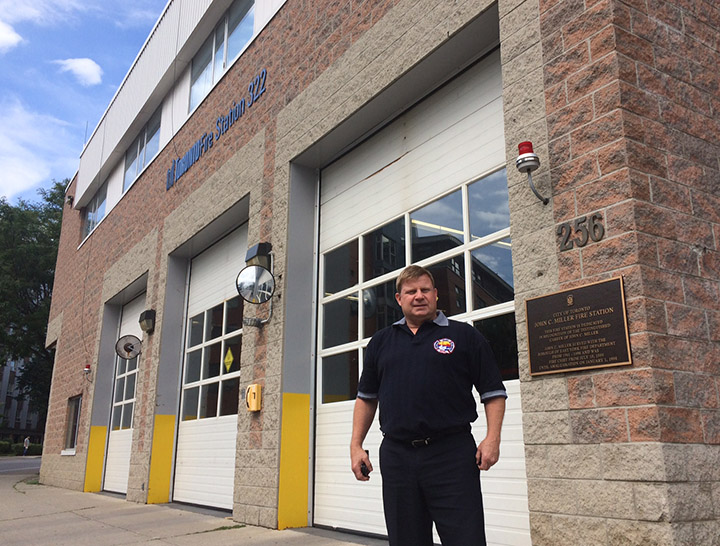According to first responders such as veteran Toronto firefighter Kevin Doherty, who are experiencing symptoms of post-traumatic stress disorder (PTSD), there is a critical need for additional supports to be made available to emergency services personnel.

“I’ve been to too many funerals when I see these guys taking their own lives – not being able to deal with those issues – and I know I’m not much different than those guys,” Doherty told Global News as he reflected on his 28-year career with Toronto Fire Services as well as his journey to seek treatment and to help others struggling with PTSD.
A new report by the International Association of Fire Fighters (IAFF) has found an “alarming” number of first responders are experiencing PTSD due to “repeated exposure to horrific events” while on the job. It also pointed to studies showing increased cancer rates for firefighters versus the general public due to exposure to toxins and hazards at incident scenes.
READ MORE: ‘A lot of people out there are suffering’: First responders speak about PTSD
“Prolonged and regular exposure to traumatic events trigger PTSD at rates similar to those found in service members returning from combat,” the report, which cited multiple health studies, said. The IAFF referenced one study that estimates over 17 per cent of Canadian firefighters and paramedics reported rates of PTSD.
“Under extreme stress, they face the possibility of not saving a life despite their best efforts, of losing one of their comrades, or not making it home to their own families.”
Doherty knows the pain of losing a colleague. While responding to a fire in 1992, Capt. Andy DesLauriers died at the scene of a fire in North York. The incident prompted a change in procedures for firefighters but for Doherty, it was his first experience with workplace trauma.

Get weekly health news
“The job changed and my mindset changed,” Doherty said.
However, it was a horrific call in 2008 that marked a downward emotional spiral for Doherty after he found the body of North York florist Felicia Hosany, who was suffocated by duct tape covering her mouth.
“It was the call that took me down, or really changed my whole psyche,” Doherty said.
“Next thing I know, I just couldn’t concentrate on a lot of things,” he said, adding he kept rethinking what more he could have done to help Hosany.
“I could see me going down a slippery road. I didn’t even really know what it was, but I just didn’t feel comfortable in my own skin.”
After the initial call and subsequently testifying in court, Doherty said his mindset and temperament started to change. He tried switching stations in an attempt to embrace new surroundings. Doherty turned to alcohol in order to stop reliving the images but the drinking eventually turned to drug use.
READ MORE: Ontario passes legislation on PTSD treatment for first responders
In 2012, Doherty went on sick leave after not being able to figure out what exactly was going on.
Doherty entered addiction rehabilitation and began seeing a therapist, who diagnosed him with post-traumatic stress disorder.
“[The diagnosis] gave me almost like a relief that there’s something there that made me change but [I needed] to make the change back,” he said.
“I needed to know how to manage what I am today. If I don’t do the things Kevin Doherty needs to do, the next thing you know I’ll fall back into my addiction.”
It took three years in order to return to work, but Doherty persevered and was promoted to station captain after his return to work in 2015. He still visits his therapist in order to manage his PTSD systems. Doherty currently works in an administration position responsible for quality management and continuous improvement for the service. He occasionally fills in as an acting district chief.
Outside of work, Doherty is working with the Toronto Professional Fire Fighters Association to advocate for enhanced supports for first responders and those dealing with addiction.
In addition to calling for quicker access to addiction treatment facilities, he wants to see a “peer support with lived experience” program setup for firefighters. He envisions a program where members can come together collectively in an anonymous setting to positively talk about their personal stories.
READ MORE: First responder PTSD support group offering help to Fort McMurray firefighters
Frank Ramagnano, president of the Toronto Professional Fire Fighters Association, said the union is moving into a new building and renovations are planned for a dedicated meeting space that has a separate entrance from the building. He said it would allow members to access the room without being seen by other people in the building.
Ramagnano said the union, which represents over 3,000 members, is considering the establishment of a support group. He also referenced dedicated programs and spaces for emergency services personnel to get support for PTSD.
He agreed with Doherty about the need for additional supports.
“There is a tremendous amount that can be done more and to be honest, even our association can be doing more,” Ramagnano said.
“We need to figure out just what the processes are for recognizing it, also letting more people know they can recognize it, bring it forward and there will be no stigma bringing it forward.”








Comments